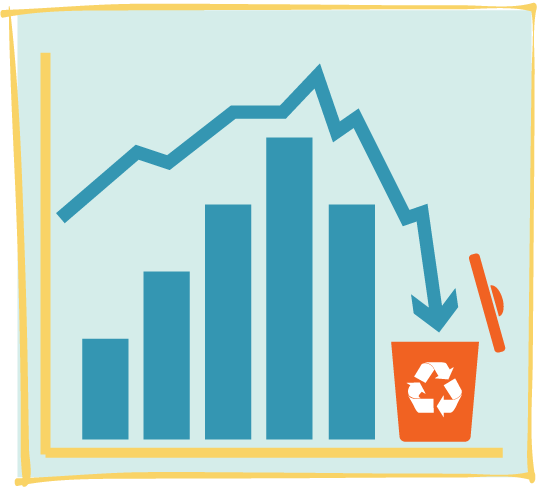Ghost in the Machine
by Lucy Vernasco
Federal research and data have helped to create everything from new life-saving medicines to the internet, driving innovation and economic growth. But that doesn’t mean that every administration wants to share it. And, in some cases, presidents have used their executive power to scrub data of important context that actually misleads other researchers, policymakers or would-be entrepreneurs.
That’s why, since dawn on Nov. 9, 2016, researchers have been racing against the clock in the name of protecting research datasets. The fact that references to climate change were taken down from the White House website on Jan. 20 have only stoked fears, as have other developments.
President Trump has placed a gag order on the Department of Agriculture and the Environmental Protection Agency (EPA). Employees are forbidden from “providing updates on social media or to reporters” and no new contracts or grants may be awarded until further notice. Even before he took office, the new president asked the Department of Energy to report the names of all employees who had worked on climate change initiatives during the Obama administration, a request that was refused.
“There is a sense of urgency to all of this,” said Billy Fleming, an urban designer and policy specialist who is currently a doctoral student at University of Pennsylvania and a fellow in the Penn Program in the Environmental Humanities (PPEH).
Like many academics, Fleming relies on federal datasets to perform his research on city and regional planning. After the election, Fleming began receiving alarming emails from his professional association listservs.
“Senior academics, they aren’t people who are prone to using very colorful and energetic language,” Fleming said. “They are some of the driest people I know, and they were sounding alarm bells. Most of that was based on their experience with the [George W. Bush] presidency, and a lot of these folks work in either some field that’s related to environmental science or social justice or criminal justice.”
After President Bush’s inauguration, these researchers and academics began to see the datasets and web tools disappear or the information suppressed on federal websites. According to the Union of Concerned Scientists’ (UCS) Scientific Integrity Program, during Bush’s presidency researchers found suppressed, inflated and distorted data about endangered species, including the trumpeter swan, Florida panther and bull trout.
The UCS report says officials at the U.S. Fish and Wildlife Service “censored an analysis of the economics of protecting the bull trout, a threatened trout species in the Pacific Northwest, publishing only the costs associated with protecting the species and deleting the report’s section analyzing the economic benefits.”
According to a 2008 article by The Washington Post, the EPA responded to a $2 million funding cut by closing physical access to “three regional office libraries in Chicago, Kansas City and Dallas, and to the headquarters library and the Chemical Library in Washington,” and reduced hours at several other libraries. The reduction in data access negatively impacted the work of researchers, academics and
climate scientists.
At a mid-November PPEH meeting, Fleming raised his concerns about disappearing data.
“It was clear almost right away after I raised that concern that that conversation was happening in parallel in pretty much every discipline that has some reliance on federal funding or public data to exist,” Fleming said. “Which is to say, every academic department in the country was on the precipice of panic when they realized what would happen to all the things that make their work possible.”
In response to research anxieties, a group of concerned professionals launched DataRefuge, a “public collaborative project” created to address concerns around federal environmental and climate data. Among those who initiated the program are Bethany Wiggin, an associate professor of German and the founding director of PPEH, and Patricia Kim, a PPEH program coordinator and doctoral student—along with PPEH fellows.
“Policymakers work in a political context and their decisions affect accessibility to science,” Wiggin told Bloomberg Markets. “More copies in more places is always a good idea.”
DataRefuge and the Internet Archive’s End of Term Presidential Harvest project are becoming offloading destinations for critical research around climate change and the environment. Ideas for additional datasets can be submitted to the End of Term Presidential Harvest website.
“We realize that the populations that we work with, most of whom are very vulnerable and rely on the kind of information and resources and other digital platforms that have been created by the Obama administration over the last eight years, would find themselves in a position of unimaginable precarity,” Fleming said. “We found out there were a lot of other people working on this.”
‘A 21st-century book burning’
Eric Holthaus, a meteorologist, writer for Slate’s Future Tense and host of the podcast “Warm Regards,” has raised deep concerns about the Trump presidency and the dismantling of climate science research and resources.
President Trump, whom Holthaus refers to as a “purveyor of conspiracy theories” in a recent Washington Post editorial, is enlisting Cabinet secretaries who have spent their careers railing against the agencies to which they’ve been appointed. Some, such as Department of Energy pick Rick Perry, have in the past called for the agencies they may lead to be abolished. Perry’s prepared remarks for his confirmation hearing include that he regrets “recommending its elimination.” He is also walking back on his view of anthropogenic-caused climate change as a “contrived phony mess,” and now concedes that human activity is—in part—to blame.
The new president nominated Oklahoma Attorney General Scott Pruitt to head the EPA. In 2016, Pruitt sued the agency “over the EPA’s recently announced regulations seeking to curtail the emissions of methane, a powerful greenhouse gas, from the oil and gas sector,” according to The Washington Post.
“There is no remaining doubt that Trump is serious about overtly declaring war on science. This isn’t a presidential transition. It’s an Inquisition. It’s a 21st-century book burning,” wrote Holthaus in his Washington Post editorial. “The incoming administration is likely to be willfully hostile toward the scientific process, with far-reaching implications. One of the most tangible consequences of sharp cutbacks in federal funding for climate science is the potential loss of critical data—whether by neglect or malice—that underlie global efforts to understand our climate system. By all accounts, that’s exactly what Trump and his team want: Ignorance of how human actions are affecting our planet makes it easier to maintain the status quo.”
Since Trump’s presidential win, Holthaus has been active in identifying datasets that are likely to be threatened by the incoming administration. Th
e meteorologist has been working in conjunction with University of Pennsylvania and PPEH to identify and archive vulnerable datasets.
“I don’t think that it’s a coincidence that people are scared about what might happen to environmental data in this country when the nominee for the secretary of state is an ExxonMobil executive,” Fleming said.
Data destroyed ‘with the stroke of a pen’
On Jan. 13 and 14, PPEH held DataRescue Philly at the University of Pennsylvania Library with more than 250 participants copying 3,692 web pages. The focus of the archive was largely the National Oceanic and Atmospheric Administration.
According to a blog post from Patricia Kim, “All the datasets from the National Center for Environmental Information (NCEI); National Environmental Satellite, Data, and Information Service (NESDIS); National Marine Fisheries Service (NMFS) as well as a significant portion of the Office of Oceanographic and Atmospheric Research (OAR), were successfully seeded to the Internet Archive.”
Dataset archiving events similar to PPEH’s took place before the inauguration with Guerilla Archiving at University of Toronto, #DataRescueChicago, DataRescueIndy and #ProtectClimateData in Los Angeles. The Sierra Club is also archiving and downloading information. The urgency is widespread in the environmental advocacy sector.
Once the datasets are moved or completely removed from federal websites, it can be extremely difficult and expensive for researchers to gain the information through Freedom of Information Act requests.
“I’m worried that under the Trump administration, that environmental data might not be as available as it has been,” said Ted Wong, co-founder of the Bellwether Collaboratory in Philadelphia.
Wong, an ecologist, programmer and data storyteller, participated in DataRescue Philly over the weekend before inauguration. His problem-solving consulting firm helps organizations think through environmental processes including climate change. Wong is not only concerned about climate data that would affect his clients but also air, water quality, fishery, forest productivity, energy and pollution data, which “paint a picture of the state of the country.”
“Trump doesn’t really seem to have a lot of respect for science-driven planning or science-driven anything, and theoretically he could shut the gates on, or even destroy, all that amazing data with the stroke of a pen,” Wong said. “You know how people say that you should hope for the best but prepare for the worst? I don’t have a lot of hope these days, and I’m doing everything I can to get ready for the worst.”
Coryn Wolk is a Philadelphia-based writer and environmental advocate. Wolk learned about DataRescue Philly after working with Wiggin’s Lower Schuylkill River project.
“I work on environmental advocacy at mostly the local and state level, so a big cross-national push to preserve federal data was new territory for me,” Wolk said. “I’m not a scientist or programmer, but I am deeply concerned about climate change, so I joined the DataRescue project to contribute whatever skills I could. I also know that this is a real threat—Pennsylvania’s own environmental history shows the destructive power of a government willing and able to interfere with scientific record-keeping and research.”
Wolk said during the event on Jan. 13 that she was “struck” by how many departments are impacted by vulnerable datasets. She left the program feeling more informed about the importance of protecting climate research—and learned about programming in the process.
“This data involves all of us, and the people creating it need everyone’s support to keep it alive,” Wolk said.
With the new administration, scientists are racing against time to capture datasets that provide the truth about our natural world. Any one of the pages offloaded to DataRefuge and the Internet Archive could be the dataset that saves the world.





